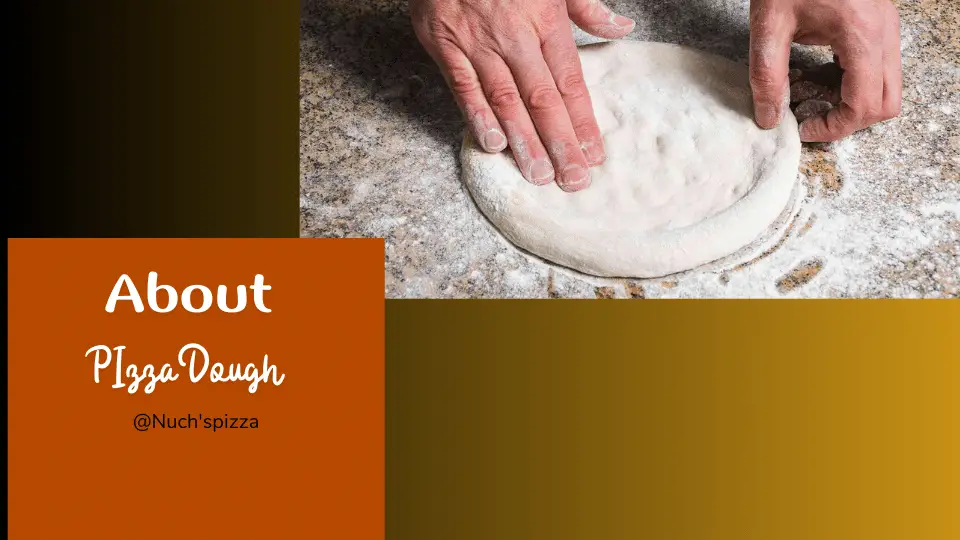We’ve all heard the age-old debate at pizza joint counters, “Should I get regular or whole wheat dough? Does it matter?” But another reasonable question is, “Does pizza dough have eggs?” If you are someone who has ever asked yourself this question and wanted to know more about what goes into that delicious crust of your favorite slice of pizza – well, you have come to the right place!
In this blog post, we will take a curious look as to whether pizza dough contains eggs, discuss possible exceptions that may occur based on restaurants’ recipes, and discover what type of positive benefits adding an egg can potentially bring. So grab your foodie partner (or an appetizer if none exists) and join us down the road full of cheesy discovery!
Article You May Like: The Difference Between Ooni Koda 12 Vs 16
What Is Pizza Dough?

At its core, pizza dough is a simple yet delicious combination of four essential ingredients: flour, water, salt, and yeast. Together these four ingredients combine to form the foundations for one of the world’s most beloved dishes – pizza! Whether you are making it from scratch or simply heating a frozen store-bought premade crust, this combination never fails to provide an enjoyable experience.
You may not be familiar with yeast, but it is an essential ingredient required in pizza dough. Yeast is an essential ingredient that helps give pizza its airy, fluffy texture when cooked. The dough could become dense and heavy without yeast – not precisely what you want for your slice!
Post You Might Be Interested In: Is Pizza Vegetarian? 5 Best Recipes For Vegetarian Pizza?
Does Pizza Dough Have Eggs?

The short answer to this question is no; traditional pizza dough does not contain eggs. However, some restaurants may choose to add eggs to their recipes if they feel the need for added flavor or texture. If so, then yes – there are pizzas out there with egg-containing dough!
For eggless doughs, water can be used as a substitute for eggs in order to provide more moisture and elasticity to the crust. Water creates a pleasant texture that is both tender and able to hold its shape. It also gives the dough an extra lift and lightness when cooked in the oven. In contrast, dough without eggs will often be less flavorful and may lack structure – leading to a soggy, flimsy crust instead of the desired airy, fluffy one. This is why some restaurants choose to add eggs to their recipes in order to provide a more flavorful and textured dough.
What Are The Benefits of Adding Eggs to Pizza Dough?
Although eggs are not typically used in traditional pizza dough recipes, they can be an excellent addition for those looking to boost flavor or add some extra moisture. Egg proteins help provide structure and stability, giving the crust more strength and elasticity when being stretched into shape. Eggs also offer a richer flavor than flour alone, making it ideal for pizzas with intense toppings like meats or vegetables. Furthermore, eggs act as an emulsifier – helping bind water and fat together so that all ingredients adhere better during cooking (which reduces shrinking).
What Are The Benefits of Adding Pizza Dough Without Eggs?
Egg-free pizza dough recipes are great for those who want to enjoy pizza’s classic, traditional taste without any added ingredients. This type of dough is much simpler and quicker to prepare than egg-based dough, requiring only four basic ingredients: flour, water, salt, and yeast. Not having eggs in your recipe also cuts down on preparation time and cost as well. The result is a light and airy crust that perfectly captures the essence of Italian cuisine.
How To Make Perfect Pizza Dough At Home?
There are different steps and techniques that one must follow in order to make the perfect pizza dough at home. Firstly, it is important to measure out all of your ingredients correctly – too much or too little of any can drastically change the texture of your dough. Using olive oil is also recommended, as it helps keep the dough moist and prevents it from sticking to your fingers or the work surface.
Kneading is essential for making a soft and pliable dough. Knead until you are able to form a smooth ball with your hands, then cover with a damp kitchen towel (or plastic wrap) for about an hour before using. If you’d like to add eggs to your pizza dough, simply mix them in with the other ingredients before kneading. However, do not add eggs if you’re using a premade crust because it may be too greasy or heavy.
You can check the dough is ready once it has doubled in size and is stretchy when pulled apart. Last but not least, remember to pre-bake your pizza dough before adding toppings! This step helps prevent a soggy crust and ensures that everything cooks evenly when placed in the oven.
FAQs
Is It Common To Put Egg Into Pizza Dough?
No, putting eggs into traditional pizza dough recipes is not common. However, some restaurants may choose to add eggs to their recipes to provide a more flavorful and textured crust.
Can You Make Pizza Dough Without Yeast?
Yes, you can make pizza dough without yeast by using baking powder as a leavening agent instead. This will result in a much denser texture than traditional yeasted doughs, but it can still be delicious!
Does Pizza Dough Need To Rise?
Yes, pizza dough needs time to rise for the yeast or baking powder to activate and create air pockets within the dough – which gives it its desired lightness and airy texture. Generally speaking, most doughs need to be left to rise for at least an hour before being shaped.
Can You Freeze Pizza Dough?
Yes, you can freeze pizza dough! Shape the dough into balls, cover it with plastic wrap, and store in a zipper bag or airtight container. The frozen dough should last up to three months. When ready to use, thaw the dough in the refrigerator overnight and then let it come back to room temperature before shaping and baking.
What Is The Best Flour For Making Pizza Dough?
The best type of flour for making pizza dough is high-protein flour such as bread flour or 00 Italian flour. These flours contain more gluten which helps create that desired light and chewy texture once baked. You can also use all-purpose flour, but it may produce a slightly denser texture.
When To Add Oil To Pizza Dough?
It’s recommended to add oil to pizza dough after it has been kneaded, as this helps keep the dough moist and prevents it from sticking to your fingers or work surface. You can also mix olive oil into the ingredients before kneading if desired, as this will help bind the water and flour together.
Do You Need To Pre-Bake Pizza Dough?
Yes, it’s important to pre-bake your pizza dough before adding toppings, as this helps prevent a soggy crust and ensures that everything cooks evenly when placed in the oven. Bake the dough for about 10 minutes at 400°F (205°C) before adding desired ingredients.
Post you might be interested in: What Is A Pizza Peel? | The Curious Cook’s Guide
Conclusion
Does pizza dough have eggs? After analyzing the various types of pizza dough, it becomes clear that the ingredients in pizza dough vary from one recipe to another. Whether or not it includes eggs depends on the type of crust desired, the texture and flavor goals, and, oftentimes, personal preference. If you are following a vegan lifestyle, it is essential to read labels or check with store personnel when purchasing premade doughs. In general, however, many classic homemade recipes are made without eggs for a light, fluffy crust that everyone can savor. So next time you break out the rolling pin – always consider what ingredients will make your pizza the tastiest!

Iris Harper is a professional writer and restaurant set up consultant. She has over 10 years of experience in the food industry, and loves providing her clients with top-quality service. Her food reviews are highly sought after, as she has a knack for discovering new and delicious pizza creations.






